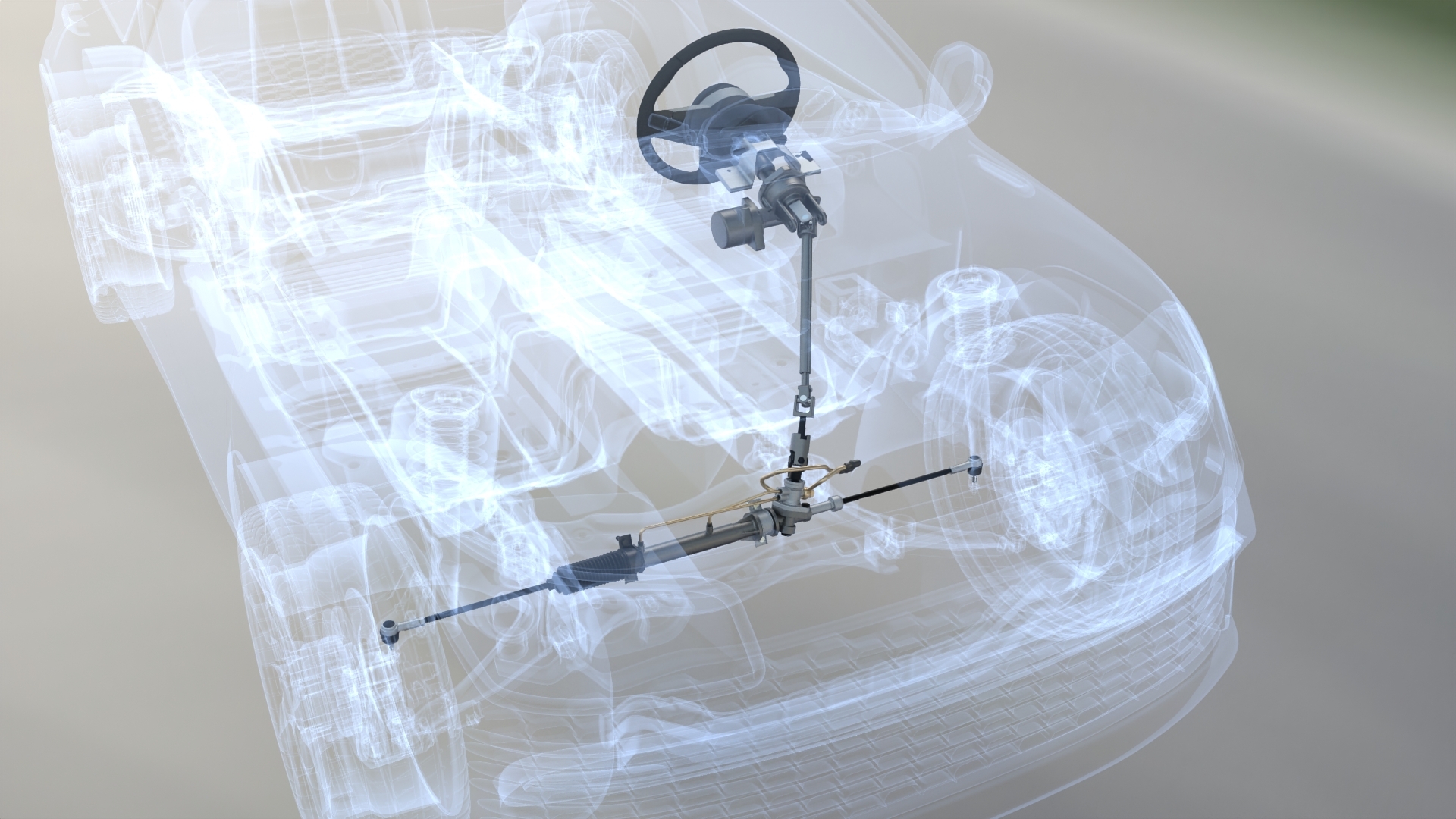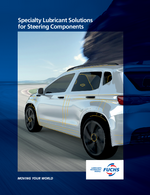Steering in the future
As a holistic partner of the automotive industry, FUCHS provides lubrication solutions for all components of a vehicle – from brake and steering systems, driveshafts, axles, transmissions, and shock absorbers to interior components such as seats, dashboards, and sunroofs. In all areas, including steering, lubrication plays a vital role in increasing the life, efficiency, and reliability of the systems.
Steering systems are becoming increasingly more advanced as OEMs design the next generation of electric and autonomous vehicles that prioritize safety, comfort, control, feel and precision. For example, lubrication reduces friction, which in turn reduces the amount of power drawn on assist motors. Thus, extending the driving range of electric vehicles. Lubrication also reduces heat caused by friction, to protect and prolong the life of components, such as worm gears or seals. Thus, making them less susceptible to failure. This helps to avoid safety critical issues, warranty claims, and costly recalls.
Lubrication Advantages
- Minimize Noise
- Reduce Power Consumption
- Impart a Quality Feel
- Extend component Life
Components Lubricated
- Bearings
- Gears
- Seals
- Splines
Download our Brochure
Solutions for Your Entire Steering System
For plastic-to-metal interfaces, a medium-viscosity, synthetic hydrocarbon grease enhanced by PTFE ensures good slip and low “stiction.” For metal-to-metal interfaces, a heavier synthetic hydrocarbon grease is recommended. A lighter grease designed for sliding surfaces is recommended for tight tolerances between telescoping shafts.
Product | Chemistry | Temperature Range | Product Description |
FLUOROCARBON GEL 866 | PAO/PTFE | -54 to 125 °C | A light viscosity grease intended for instruments with moving plastic parts, gears and slides |
Rack and pinion designs often feature high loads and tight tolerances. Lubricants formulated with Extreme Pressure additives withstand high loads to reduce friction to prevent wear. A lubricant with good adhesion and low temperature performance is recommended to ensure reliable operation. Plastic and steel compatibility should also be considered.
Product | Chemistry | Temperature Range | Product Description |
RENOLIT CX-SPS 0 | Synthetic Oil/ Calcium Complex Soap | 40 to 130 °C | A medium viscosity, plastic-compatible grease with excellent relubrication properties for components requiring low friction and great thermal management as well. |
RHEOLUBE 393 | PAO/Lithium Soap | -40 to 125 °C | A heavy viscosity grease intended for CV joints. |
RENOLIT JP 1619 N OEM | Synthetic Oil/ Lithium Soap | -50 to 120 °C | A light viscosity synthetic hydrocarbon grease fortified with EP additives and corrosion inhibitors to improve adhesion and load carrying |
If not properly lubricated, couplings, and ball bearings located at the end of the steering column, can transfer noise and vibration through the steering column up to the driver. Greases can quiet these applications and provide durability and wear protection. Load should be considered when selecting a grease. Heavily loaded designs require a heavy viscosity grease to ensure the proper wear prevention and mechanical damping properties.
Product | Chemistry | Temperature Range | Product Description |
FLUOROCARBON GEL 868MS-X | PAO/PTFE | -40 to 80 °C | A medium viscosity grease fortified with EP additives and rust inhibitors |
FLUOROCARBON GEL 868MS-X | PTFE | 40 to 125 °C | PTFE thickened, medium viscosity, synthetic hydrocarbon grease for components requiring light tack and minimal change in damping characteristics with temperature. |
RHEOLUBE 362HB | PAO/Lithium Soap | -40 to 125 °C | A light viscosity grease fortified with PTFE, tackifiers, rust inhibitors, and UV tracers. |
NYOGEL 774VLF | PAO/Silica | -50 to 120 °C | A light viscosity grease fortified with a PTFE additive that offers good water resistance and damping characteristics. |
Light weight synthetic hydrocarbon greases with advanced additive packages greatly reduce frictional torque between the gearing components. This allows for lower current draw over extended periods of use. They also improve low temperature torque performance, while providing wear protection and vibrational damping. Grease can also be used for its thermal management, corrosion protection, and wear mitigating capabilities.
Product | Chemistry | Temperature Range | Product Description |
RENOLIT CX-SPS 0 | Synthetic Oil/ Calcium Complex Soap | -40 to 130 °C | A medium viscosity, plastic-compatible grease with excellent relubrication properties for components requiring low friction and great thermal management as well. |
RHEOLUBE 363F | PAO/Lithium Soap | -50 to 125 °C | A medium viscosity grease fortified with PTFE for bearings, gears, and slides that require low friction. |
RHEOLUBE 462CF | PAO/Lithium Soap | -54 to 130 °C | A light viscosity grease with excellent low temperature performance and a low coefficient of friction for sliding applications. |
RENOLIT ST-SW 1 | Synthetic /Aluminum Complex Soap | -40 to 130 °C | A special light viscosity grease with unique additive package for ageing resistance and low temperature applicability |
The friction from the junction of the yoke and steering rack can transmit vibrations that are felt by the driver. Yokes require a grease with excellent damping characteristics to minimize noise and vibration. Lubricants with good film strength are ideal tare ideal for these sliding conditions to reduce friction.
Product | Chemistry | Temperature Range | Product Description |
RENOLIT JP 1619 N OEM | Synthetic Oil/ Lithium Soap | -50 to 120 °C | A light viscosity synthetic hydrocarbon grease fortified with EP additives and corrosion inhibitors to improve adhesion and load carrying |
RENOLIT CX-SPS 0 | Synthetic Oil/ Calcium Complex Soap | -40 to 130 °C | A medium viscosity, plastic-compatible grease with excellent relubrication properties for components requiring low friction and great thermal management as well. |
FLUOROCARBON GEL 875MS | PAO/PTFE | -20 to 125 °C | A heavy viscosity grease fortified with EP additives and rust inhibitors |
Bellows protect the steering rack and pinion and tie road end from external contamination and hence optimize gear performance. The grease helps seal these bellows which potentially operate at wide temperature ranges.
Product | Chemistry | Temperature Range | Product Description |
RENOLIT JP 1619 N OEM | Synthetic Oil/ Lithium Soap | -50 to 120 °C | A light viscosity synthetic hydrocarbon grease fortified with EP additives and corrosion inhibitors to improve adhesion and load carrying |
RENOLIT CXS BGR
| PAO/ Calcium Sulfonate Complex | -50 to 170 °C | A light viscosity, multi-purpose grease with superior water resistance. |
The input shaft connect is a universal joint which links the intermediate steering shaft with the rest of the steering system. This joint requires a mechanically stable, corrosion resistant and wide-temperature grease.
Product | Chemistry
| Temperature Range | Product Description |
NYOGEL 774 | PAO/ Silica | -30 to 120 °C | A medium viscosity grease intended for mechanical components requiring a light amount of damping. |
The ball nut helps overcome friction and wear in the steering gear through circulation of ball bearings between the worm and the nut itself. The grease helps overcome energy losses by further reduction in friction between the two metal surfaces and loading conditions.
Product | Chemistry | Temperature Range | Product Description |
RENOLIT BNG 1 | Synthetic Oil/ Lithium Soap | -40 to 130 °C | A low viscosity synthetic low friction coefficient grease with good EP and antiwear properties and low starting and running torque. |
Custom Electric Power Steering Testing
Our custom EPS Test Rig is a multi-stage system that allows our engineers to simulate road conditions and life endurance tests on customer supplied EPS units while measuring frictional torque, heat generation, wear, and more. Our engineers use the data collected by this rig to formulate next-generation EPS greases that reduce frictional torque. Our EPS Test Rig is composed of three separate rigs that accurately simulate EPS operations:
Our magnetic brake system simulates an OEMs ‘run-in’ process. This is a high load, high speed, test entirely dedicated to removing high spots—or residual imperfections from the manufacturing process. When high spots are removed, it allows our engineers to understand how our lubricants will perform in an aged EPS system.
The EPS rig uses a feedback loop with two server motors that rotate from 0-540 degrees at 30 rotations per minute. Engineers can then use the feedback loop to simulate specific loads at different wheel rotations. OEMs are constantly trying to create systems that operate at higher loads. Our rig can simulate loads of up to 120 newton-meters to simulate the different EPS load requirements. Using the rigs infrared camera, our engineers can see the temperature distribution of the entire gear assembly. This allows us to assess how well our lubricants are reducing the amount of heat generated by the motor under specific loads and wheel rotations.
This rig is a non-loaded parking check, also known as a Backdrive check. This uses a high-resolution torque transducer to assess gear-to-torque distribution when a wheel is turned all the way in one direction. With this information, our engineers can remove the peaks and valleys of that distribution data to obtain the average gear-to-torque distribution for the system. This test allows us to understand frictional characteristics in EPS systems and how they affect the “feel” of steering.
Why FUCHS?
As the world’s largest independent lubricant supplier, FUCHS helps automotive OEMs and Tier 1 suppliers optimize the performance and reliability of their applications. With the acquisition of Nye Lubricants, a recognized technology leader, FUCHS now provides a comprehensive range of specialty lubrication solutions for steering systems that minimize noise, reduce power consumption and extend operating life of components. FUCHS also offers application testing on customer’s supplied components and generates pre-validation data to help customers save money and accelerate their time to market. Our lubrication experts consult with your design engineers to assist in selecting the right grease or oil for bearings, gears and seals within rack and pinions, steering columns, yokes, shafts, and other steering mechanisms.

